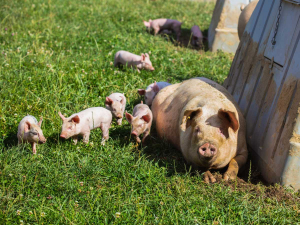M.I.A.
OPINION: The previous government spent too much during the Covid-19 pandemic, despite warnings from officials, according to a briefing released by the Treasury.
 Pork NZ says the country’s pig farming industry relies on experienced workers from overseas to meet a shortfall in staff with the necessary skills required to work with the country’s pig herd.
Pork NZ says the country’s pig farming industry relies on experienced workers from overseas to meet a shortfall in staff with the necessary skills required to work with the country’s pig herd.
Pig farmers have joined a growing chorus in the primary sector calling on the Government to urgently review its migrant worker policies in the wake of Covid-19.
Both agricultural contractors and dairy farming organisations have also recently asked for rule changes around migrant workers.
“Each year, New Zealand’s pig farming industry relies on experienced workers from overseas to meet a shortfall in staff with the necessary skills required to work with the country’s pig herd,” explains NZ Pork chief executive David Baines.
He says the pig industry is concerned that skilled migrants already working on pig farms in New Zealand may not have their visas renewed or existing workers trying to return from overseas visits will be blocked, leaving many farmers with significant staffing shortages.
“The sector’s strong preference would be to have a pool of available skilled and unskilled New Zealand workers,” Baines claims.
“However, pig farming is a relatively niche sector in New Zealand and the reality is that there is a significant shortage of New Zealanders applying for these roles.”
He says the pork sector relies on a supply of skilled migrant workers who have been trained in their home countries.
“The numbers in total are small, particularly compared to major industries such as dairy, but the productivity of the industry is very vulnerable because of the precision nature of pig farming.”
Baines says NZ Pork has requested an urgent meeting with the Minister of Immigration Iain Lees-Galloway to discuss the issue.
He says pig farmers have raised concerns that migrant staff may not have their visas renewed this year.
“Or that migrant workers cannot currently enter New Zealand and that existing staff on visas are facing difficulties returning from overseas visits as a result of immigration measures taken in response to the Covid-19 pandemic.”
Baines says other issues include the cost of visas, processing times, a lack of pathway to residency and a lack of consistency from Immigration New Zealand in terms of visa length and conditions.
“While we recognise that Covid-19 has and will continue to leave New Zealanders out of work and hopefully create some opportunities locals who are prepared and willing to work on pig farms,” Baines added.
“The sector cannot wait for such people to perhaps become available. Our animals need continuous skilled and committed care to be provided.”
The 5+ A Day Charitable Trust has launched a collection of affordable recipes designed to turn everyday vegetables into seasonal stars.
Jane Mellsopp has been confirmed as the new Government Appointee to the New Zealand Meat Board (NZMB).
To celebrate the tenth anniversary of its annual Good Deeds competition, Rabobank will give away $100,000 to improve rural community hubs, schools, clubrooms, and marae across New Zealand.
Agricultural and veterinary product supplier Shoof International has appointed Michaela Dumper as its new chief executive.
Federated Farmers is celebrating following the Government's announcement that young farmers will be able to use their KiwiSaver funds to buy their first home or farm.
The Meat Industry Association of New Zealand (MIA) today announced that Chief Executive Officer Sirma Karapeeva has resigned from the role.

OPINION: A mate of yours truly reckons rural Manawatu families are the latest to suffer under what he calls the…
OPINION: If old Winston Peters thinks building trade relations with new nations, such as India, isn't a necessary investment in…